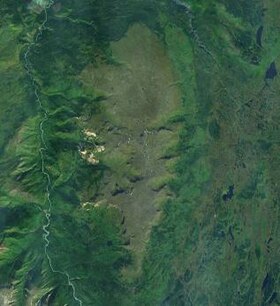Heart Peaks
| Heart Peaks | |
|---|---|

Satellite photo of Heart Peaks (middle)
|
|
| Highest point | |
| Elevation | 2,012 m (6,601 ft) |
| Prominence | 1,012 m (3,320 ft) |
| Coordinates | 58°35′56″N 131°57′48″W / 58.59889°N 131.96333°WCoordinates: 58°35′56″N 131°57′48″W / 58.59889°N 131.96333°W |
| Geography | |
| Location | British Columbia, Canada |
| Topo map | NTS 104J/12 |
| Geology | |
| Age of rock | Neogene-to-Quaternary |
| Mountain type | Shield volcano |
| Volcanic arc/belt | Northern Cordilleran Volcanic Province |
| Last eruption | Unknown |
Heart Peaks, originally known as the Heart Mountains, is a mountain massif in the Northern Interior of British Columbia, Canada. It is located 90 km (56 mi) northwest of the small community of Telegraph Creek and just southwest of Callison Ranch. With a maximum elevation of 2,012 m (6,601 ft), it rises above the surrounding landscape on the Nahlin Plateau, which is part of the western Stikine Plateau. Heart Peaks has been an area of prospecting since the 1980s with the discovery of precious metals.
Situated in a large area of volcanic activity, Heart Peaks consists of a large shield volcano. It was formed in the past 23 million years by repeated eruptions of lava and rock. However, present day eruptions have not been observed. A number of related volcanoes are adjacent to Heart Peaks and form an extensive volcanic zone over 1,000 km (620 mi) long. The knowledge of Heart Peaks is limited, especially its eruptive history.
Heart Peaks is part of the Northern Cordilleran Volcanic Province, a long volcanic chain extending from just north of the city of Prince Rupert in British Columbia through Yukon to the Alaska border. Along this line, the North American Plate has been rupturing. Earth's lithosphere consists of several large tectonic plates, which slowly move towards and away from one another, either converging and subducting or diverging and rifting; volcanoes and earthquakes are generated by these activities. The west coast of North America is the site of plate margins between the large Pacific and North American plates, and also between the smaller Juan de Fuca and Cocos plates.
...
Wikipedia

